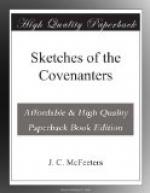The Covenanted Societies refused to follow their faithless guides into the General Assembly, to disappear there in the strange blending of religious forces. These were men of conviction; they did not vary with the weather; they thought for themselves. Some of them were aged and had seen the Covenant Temple of 1638, with its strong foundation and imposing structure. They had seen the Reformation in its glory—the Covenanted Church of Christ, purified, strengthened, and exalted, under the care of Henderson, Johnston, Guthrie, Argyle, and others whose hearts God had touched; and now they saw this reconstruction. Ah, how inferior! it was far removed from the true foundation; it was conspicuous only for its hay, wood, and stubble; they saw and wept. The Covenanted cause was practically abandoned. What Satan could not win by fire and sword, he had won by the enchantments of peace.
The Assembly submitted to the king’s supremacy over the Church. King William, like the former rulers, had seized the gem of Christ’s authority and set it in his own crown. For this royal truth the martyrs had died. Now their blood was reckoned an unnecessary expenditure. The Covenant was ignored, and its principles set aside; the Church was placed on a new basis. Thus the glory of Scotland’s Reformation sank behind a fog-bank that has never yet cleared away.
The Covenanted Societies resolved to maintain their organization, as the true representatives of Scotland’s Reformation Church; the legitimate successors of Knox, Melville, Guthrie, Cameron, Cargill, and Renwick; the rightful heirs of the Covenant, its obligations and blessings; the devoted witnesses of Jesus Christ, going forth unto Him without the camp, bearing His reproach. They had much for which to contend. The supremacy of Christ, the independence of the Church the Covenant of the fathers, the testimony of the martyrs, the purity of Divine worship, the dignity of Church discipline—all had suffered at the hands of this Assembly. Against the great defection they resolved to lift up a testimony. They would not deny their Covenant Lord, by entering into relation with Church or State, as at that time constituted and administered. These Covenanters were ridiculed as a fanatical, narrow-minded faction. James Renwick had been taunted with the question, “Do you believe that none, but those of your principles, can enter heaven?” “I never said so,” he replied; “but I do say, These are principles worth suffering for.” A noble reply to the sarcastic question which often reappears.
Narrow-minded! Breadth may be viewed from various positions. He, who attempts to broaden himself by accepting error, becomes the narrow man. Every error adopted means a truth rejected. This process may continue till the heart is so contracted that there is no room for either God or man. Ah, the irony of such broadness! How different with him who will not surrender a hairbreadth of truth! He is the broad man; broad as the law of God, broad as the Gospel of Christ, broad as the principles of the everlasting Covenant, broad as the kingdom of heaven. Those Covenanters were the broadest men of their day.




